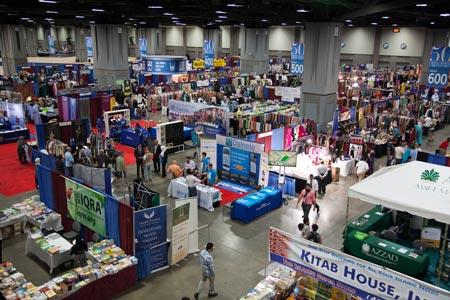US Convention Empowers Young Muslims

“The baton is being passed to a new generation of Muslim activists, and there are new ideas and a different way of doing things,” Edgar Hopida, communications director for ISNA, told OnIslam.net.
“So we need to think about who’s going to step up and produce a viable American-Muslim community,” said Hopida.
This year’s theme is Generations Rise: Elevating Muslim American Culture.
According to Hopida, the topic is relevant to how the American-Muslim society is changing and how young people are making their mark.
“Several generations ago (they were) building mosques and basic institutions. Now we need to refine and get beyond by building civil rights organizations and people who produce culture like art and music,” he said.
Convention organizers said looking at how Islamic and Muslim culture fits into American society is a growing challenge for Muslims.
Several panel discussions will analyze the different ways culture manifests itself into everyday society, including one that will look at the place of culture in regards to Shariah principals.
Practical advice about how to tread the line between expressing one’s creativity while avoiding corruption or going against Allah’s laws will be discussed.
Elizabeth Johnson, a 30-year-old Islamic convert, said she is excited about the focus on culture.
“In many ways culture defines and guides all that we do, think, and say,” said Johnson, who has been Muslim since 2005. “The culture we are raised in develops our global view, including the way we analyze and interpret theology and political ideology.”
Referring to America as a “melting pot,” Johnson said the United States is the perfect place to have such a discussion.
“Having Muslims from many different cultures in a country as unique as ours is a sure way to get a progressive, modern take on Islamic law and interpretation.”
Young Chances
This year’s theme was set after noticing a remarkable success for younger imams are showing Muslims how popular culture can fit into their Islamic lifestyles.
“There are still people with an old way of doing things, but there’s also a transition happening,” Hopida said, adding that younger generations are more open and finding out that there is permissibility to merging their modern culture into their religious practice.
Successful imams included Usama Canon, founding director of Ta’Leef Collection, and Khalid Latif, executive director and chaplain for the Islamic Center at New York University.
Yassir Amir, a 56-year-old Pakistani who came to the States nearly 30 years ago, said he is happy to see young people take on more responsibilities, but hopes they will keep their religious values intact.
“I would hate to see Islam pushed to the side just to embrace new ideas,” he said.
Another convention panel will welcome young Muslim activists and leaders who will be called on to talk about modern culture.
While recognizing that culture offers unique and positive opportunities for Islam, the panel members will offer up their opinions on particular challenges other young people and the future of Islam in America will face.
Both Hopida and Johnson said portraying Islam’s post-Sept. 11 image remains a struggle.
“We have been challenged in the last decade and a half to justify our religion,” Johnson said. “Our religion needs no justification so long as we follow it, nor will anyone ask us for a justification if our compatriots see us playing an active role in the country.”
Hopida said the 2001 attacks came as a wake-up call to Muslims in America.
“We’ve made ourselves insular, but we can’t be our own little shell,” he said, adding that it’s up to younger Muslims, in part, to drive the change.
“Those who were born and raised here have a different way of looking at things as an American,” Hopida said. “There’s been a shift in terms of what we look at as priorities.”
Johnson said increasing Muslims’ visibility is key to forging a positive path moving forward.
“Let's get out there and run marathons, attend protests, put together fundraisers in our communities, strengthen our national image, and be good role models,” she said. “Actions speak louder than words, and we need to turn up the volume.”
In addition to panel sessions, convention participants will hear from former US President Jimmy Carter, who will talk about how to combat community violence.
They can also take part in a wide variety of activities including a trade bazaar, film festival, art exhibit, health screenings, and other events.
For more information including a full list of events and how to register, log on towww.isna.net.
Source: On Islam



